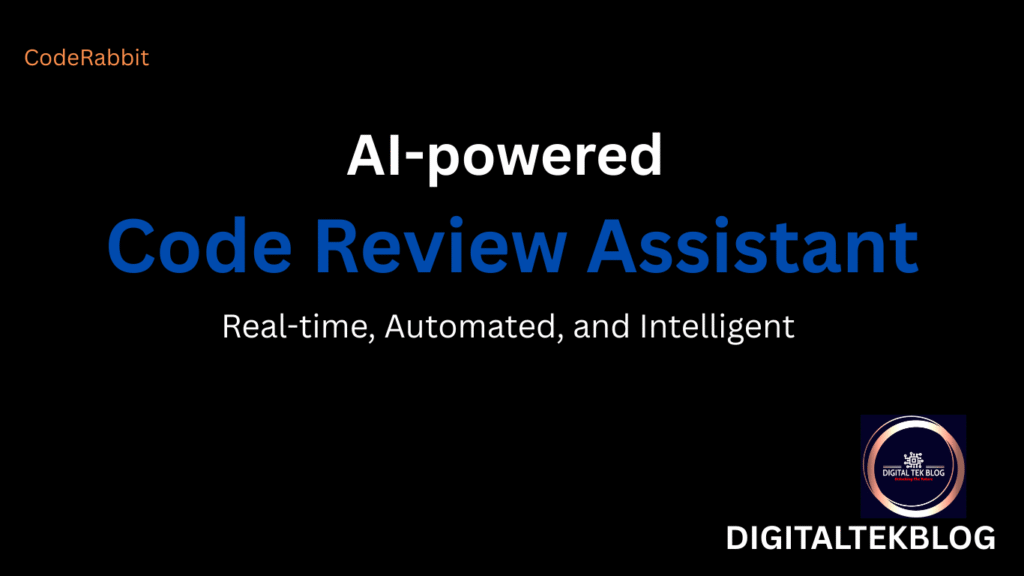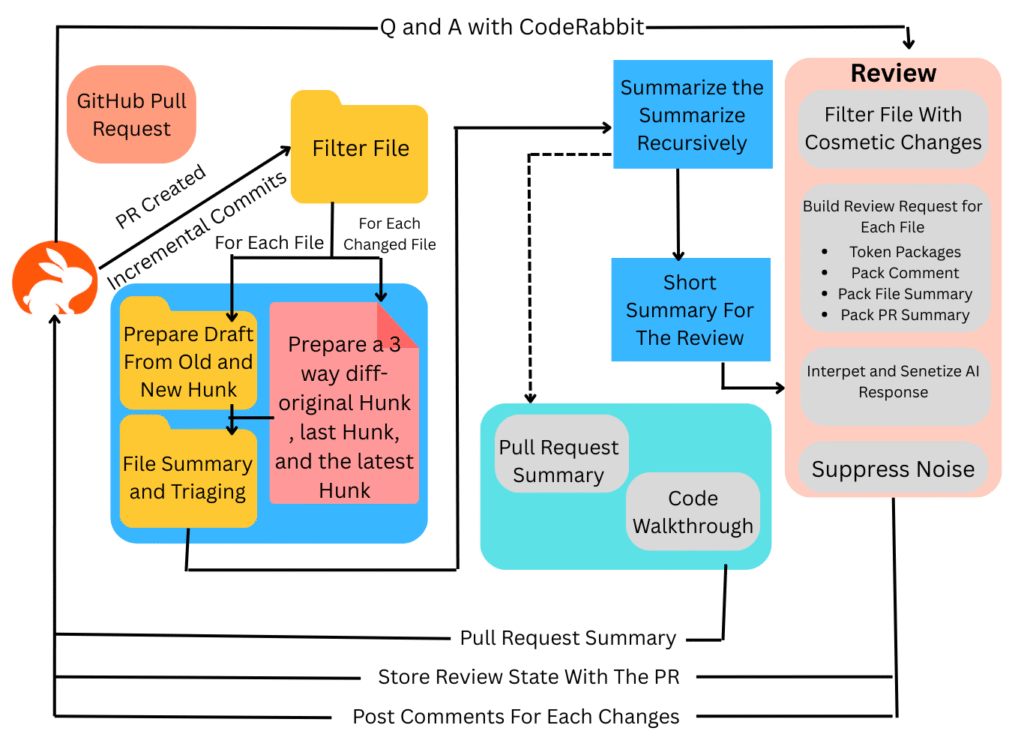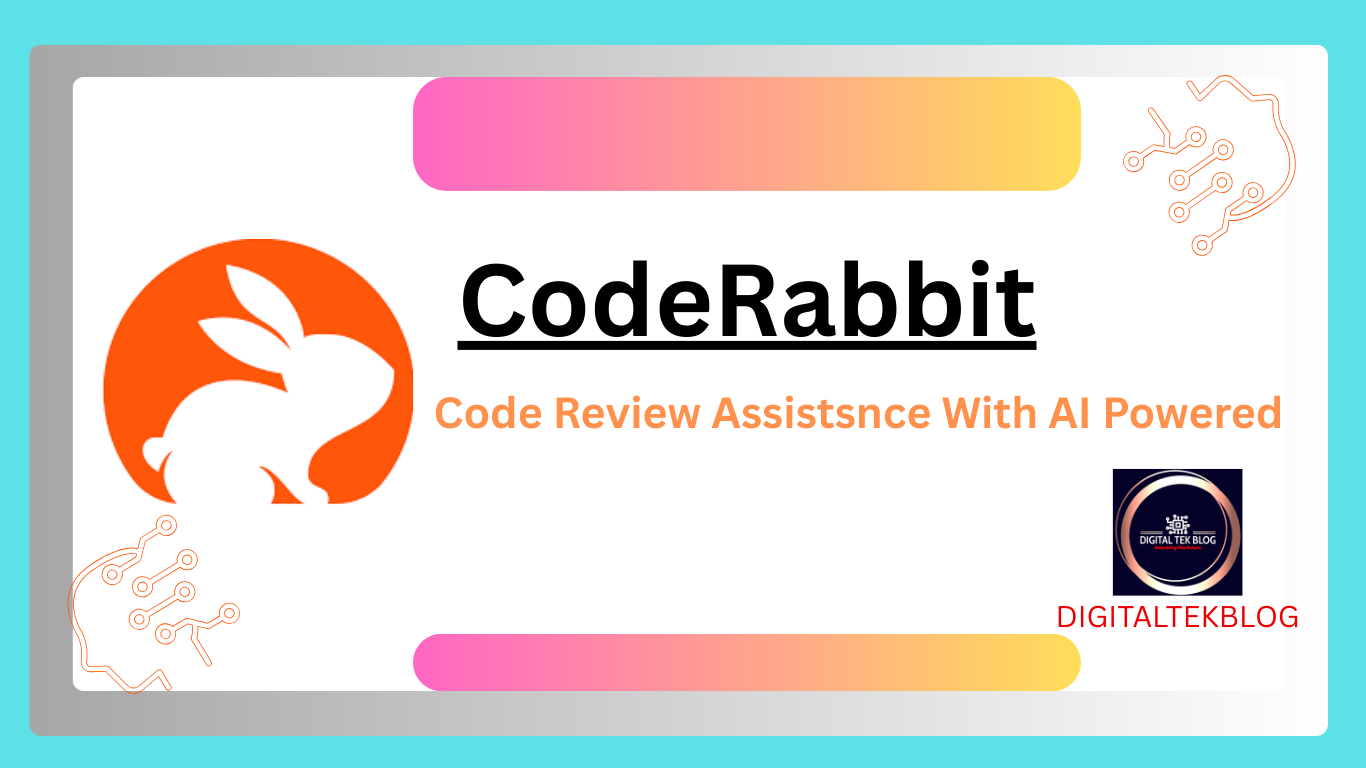What Is CodeRabbit?—The Smart AI Code Reviewer You Need

CodeRabbit is an AI-powered code review assistant designed to streamline the software development process by providing real-time, automated, and intelligent code reviews inside your GitHub pull requests. Built with developers and teams in mind, CodeRabbit enhances code quality, accelerates development cycles, and reduces the time spent on manual reviews.
It acts as a virtual reviewer that understands your code, offers suggestions, flags issues, and even explains best practices — all without slowing down your workflow.
Key Features of CodeRabbit
- ✅ Automated Code Reviews: Analyzes every pull request and suggests improvements in real-time.
- 🧠 AI-Powered Context Understanding: Uses natural language and machine learning to interpret code and provide smart feedback.
- 📘 Explains Code Suggestions: Offers human-readable explanations behind its review comments, ideal for learning and team collaboration.
- ⚙️ Customizable Rulesets: Lets teams define and enforce their own coding standards and policies.
- 🔒 Secure by Design: Does not store your code externally. All reviews happen through GitHub integrations, respecting your data privacy.
💡 Use Cases for CodeRabbit
CodeRabbit is an intelligent, AI-powered assistant that automates the code review process directly inside GitHub pull requests. By leveraging advanced language models (LLMs), CodeRabbit helps software development teams maintain high code quality, catch bugs early, and improve collaboration — all without adding friction to their workflows.
- Startups wanting to speed up development without hiring a full-time reviewer
- Open-source projects where code quality must be maintained with many contributors
- Agile teams needing fast, accurate reviews to keep sprints on schedule
- Junior developers who want to learn from AI explanations and improve their codebase
- Codebases under heavy refactoring where manual reviews become overwhelming
🚀 Why CodeRabbit Is Gaining Popularity
In modern development environments, especially with growing teams and faster release cycles, maintaining code quality is a serious challenge. That’s where CodeRabbit shines. It uses large language models (LLMs) to review your pull requests instantly, making it a powerful co-pilot for any GitHub-based project.
Whether you’re building a startup MVP or contributing to enterprise-grade software, CodeRabbit helps you write cleaner, more efficient, and production-ready code.
🚀 How CodeRabbit Works
When a developer opens a pull request (PR) on GitHub, CodeRabbit scans the proposed changes and automatically adds review comments, suggestions, or alerts based on:
- Syntax issues
- Logic errors
- Code style violations
- Security risks
- Performance bottlenecks
- Best practice deviations
Unlike traditional linters or static code analysis tools, CodeRabbit doesn’t just check for patterns — it understands your code in context, thanks to AI.
🔍 What CodeRabbit Actually Does for Developers
Here’s a breakdown of CodeRabbit’s core functionality:
1. Automated AI Code Reviews
- Instantly reviews every pull request
- Leaves inline comments just like a human reviewer
- Identifies bugs, redundancies, and unnecessary complexity
2. Human-Like Code Suggestions
- Offers suggestions with natural language explanations
- Explains why something should be fixed or improved
- Encourages clean, readable, and maintainable code
3. Custom Review Policies
- Supports custom configurations and rule sets
4. Secure by Default
- Runs within GitHub’s infrastructure
- Never exports or stores code externally
- Complies with secure software development practices
🎯 Benefits of Using CodeRabbit
- 🕒 Saves Time: Automates tedious code reviews so teams can focus on shipping features.
- 🔍 Reduces Bugs Early: Identifies issues before code is merged or deployed.
- 📚 Educates Developers: Especially helpful for junior developers who learn from AI-generated feedback.
- 🤝 Improves Collaboration: Standardizes code reviews across the team.
- 📈 Boosts Code Quality: Enforces consistent practices across projects and developers.
🧑💻 Who Should Use CodeRabbit?
- Software development teams looking to speed up reviews without sacrificing quality
- Tech startups needing scalable QA processes
- Open-source project maintainers managing multiple contributors
- Agile teams releasing code frequently
- Freelancers or solo devs seeking real-time second opinions
🔧 Real-World Examples of CodeRabbit in Action
- 🔹 Flags hard-coded API keys in a React app
- 🔹 Suggests more efficient SQL queries in backend PRs
- 🔹 Explains why a function should be split for readability
All of this happens automatically, within seconds, right in the GitHub interface.
🛠 CodeRabbit vs Traditional Code Reviews
| Feature | CodeRabbit | Traditional Reviews |
| Speed | Instant | Hours to days |
| Consistency | Always consistent | Varies by reviewer |
| Cost | Low/automated | Depends on reviewer time |
| AI-Powered Suggestions | Yes | No |
| Human Feedback | No (but detailed AI feedback) | Yes |
How does CodeRabbit work?

CodeRabbit is a powerful AI-powered code review tool that integrates directly with GitHub to automate the process of reviewing code in pull requests. It uses advanced Large Language Models (LLMs) to understand code, context, and intent — making it far more intelligent than traditional linters or static analysis tools.
Whether you’re a solo developer or managing a large team, CodeRabbit helps ensure code quality, speed up development cycles, and eliminate human bottlenecks — all while working seamlessly inside your existing GitHub workflow.
🚀 Step-by-Step: How CodeRabbit Works
Let’s walk through the full process of how CodeRabbit functions:
1. 🔗 Connects to Your GitHub Repository
After installation via the GitHub Marketplace, CodeRabbit connects to your repositories using GitHub Apps integration.
- No complex setup required
- Secure OAuth access
- Select specific repos or org-wide configuration
2. 🧪 Monitors Pull Requests in Real Time
Whenever a developer opens or updates a pull request, CodeRabbit is automatically triggered. It detects:
- New commits
- Code diffs
- Changed files
It instantly starts reviewing the code changes without you needing to request a review manually.
3. 🤖 Performs AI-Powered Code Analysis
This is where the magic happens. CodeRabbit uses LLMs (like GPT) to:
- Understand your code structure, logic, and syntax
- Analyze context within and around the PR
- Detect potential bugs, anti-patterns, inefficiencies, and best practice violations
Unlike simple linters, it can “read” your code much like a human would — with logic, style, and reasoning.
4. 💬 Adds Inline Review Comments Automatically
Once the AI has analyzed the code, it adds human-like comments inside the PR review section.
Each comment typically includes:
- What’s wrong or needs improvement
- Why it matters (performance, security, readability, etc.)
- Suggestions for how to fix it
- Explanations to help developers learn from the feedback
5. 🔧 Supports Custom Configurations
You can tailor CodeRabbit to your team’s specific needs:
- Ignore certain file types or directories
- Adjust the tone or strictness of comments
- Enable/disable certain review rules or language-specific checks
- Configure for multiple programming languages like Python, JavaScript, TypeScript, Go, and more
6. 🔐 Works Securely Without Exporting Code
CodeRabbit is designed with developer security in mind:
- Code stays within GitHub
- No external code storage or transmission
- Private repo support
- Compliant with GitHub’s security standards
7. ✅ Improves Over Time with Feedback
As you and your team resolve or dismiss comments, CodeRabbit learns from your preferences.
- It starts tailoring suggestions based on past interactions
- Can align more closely with your coding conventions and team style
🎯 Key Advantages of CodeRabbit’s Workflow
| Feature | Benefit |
| ✅ Real-time reviews | Speeds up CI/CD pipelines |
| 💬 Human-like feedback | Easy to understand and implement |
| 🔧 Customizable rules | Adapts to your team’s coding style |
| 🧠 AI contextual logic | Smarter than static linters |
| 🔐 Secure by design | Trusted for both public & private repos |

